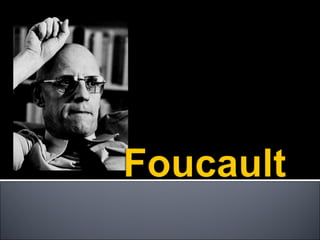Foucault
- 1. Ã˝
- 2. Philosophy, history, psychology, sociology, medicine, gender studies, literary and cultural critique. Power, self identity, epistemology, and the evolution of systems of thought and meaning. Social construction and Human Nature
- 3. Structuralism An attempt to unify the human sciences by applying a single methodology Saussure and Levi-Strauss Breaking down language into precise units and then interpreted objectively Interpretations relied upon very precise definitions of concepts
- 4. No one text has meaning, rather it is a web of relations Text is penetrated by outside forces “ ever shifting, unstable, and open to question”
- 5. Normal v. Abnormal Time based concepts We define normal through abnormal
- 6. Accounting for the individual through the development of science and the study of death
- 7. Episteme What constitutes as acceptable? Man becomes both object and subject of study The advent of human sciences
- 8. Human Nature We can only see the world on our own terms Challenges Sartre and Existential Freedom Meaning is not predetermined by outside forces, it is constructed by men – we make it up as we go
- 9. The Resistance http://www.youtube.com/watch?v=8TDSLaDZHLo&feature=related Everything is accounted for by the system.
- 10. Power acts through us Power is the texture of our lives, we live it rather than have it, and we can not escape it. Power-knowledge
- 11. A shift in understanding of power Traditional power; Monolithic, hierarchical, clearly visible New notions: Ensures by right, technique, normalization, control More subtle than traditional roles, thus easier to overlook and harder the resist
- 12. Scientia Sexualis and Ars Erotica The truth of sexual procedure versus the erotic art, and the truth that is drawn from pleasure. The invention of the homosexual











